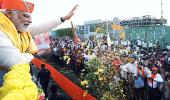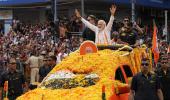With the general election campaign less than six months away, the BJP has more to think about than it had on the eve of 2019.
It's the states that will be robbing BJP strategists of their sleep at this point, not the Lok Sabha, asserts Shekhar Gupta.

You can pick your preferred description for the Narendra D Modi government suddenly pulling out the idea of one nation, one election: A pre-election grand distraction, or a trial balloon.
The important thing is to understand where the idea is coming from. Also, for brevity, let's start calling it ONOE.
True to their by now familiar method of the grand spectacle, this is topped by the idea of a special, five-day Parliament session.
It guarantees five days of live TV coverage and primetime 'debates', all generally weighted in favour of the idea.
You can also be sure that all heavyweight anchors, with the exception of one-and-a-quarter, will give it their full-throated support.
Some might bring to this the passion usually reserved for Pakistan, China, or George Soros.
Theatre, however grand, will not change the fact that ONOE is not possible unless two-thirds of the states endorse it.
That the Bharatiya Janata Party hasn't secured their support is its deepest pain point. That's why this frantic ploy.
The logical final objective would then be 'one nation, one election, one party' in all states and the Centre.
In politics, aspiration is a good thing. It's just that your rivals' aspirations run contrary to yours.
That's why the BJP has lately failed in some key states and may struggle with some more this coming winter.
Particularly jarring for it is the fact that it often gets beaten in states it sweeps in Lok Sabha elections. Karnataka and Himachal Pradesh are only the latest.
ONOE is seen as a brahmastra. If your weakness is having only one leader to get you the votes across states, where most of your leaders are nobodies, why not turn it into a strength?
What if every vote was sought for Modi, whether at the Centre or in the states? Each election will be 'Modi versus who?'
To understand the politics behind the concern that's pushing the BJP, we just have to see the rapid bleaching of the saffron from the state-wise political map of India.
In 14 states now, constituents of INDIA, or other parties not aligned with the BJP, are in power.
However you describe India, a Union of states or one unified federal nation, it would be very challenging to exercise the kind of power the Modi government has got used to if, by the end of 2024, there are 18 states -- if not more -- that you don't rule.
Never mind your majority in the Lok Sabha.
That's why, in the run-up to the ONOE move, three things had underlined the intensification of the build-up to the 2024 general election campaign.

One, the call for the Amrit Kaal Parliament session. Don't be surprised if hereon, the BJP turns every election into a referendum on ONOE.
Two, the Mumbai conclave of the INDIA partners, searching for that cohesion such alliances have invariably lacked in Indian politics.
And three, the Modi government's sweeping cooking gas subsidy. Petrol and diesel price cuts may also be on the way.
This urgency is sparked by the results of the last clutch of state election results, which saw the BJP lose both Karnataka and Himachal Pradesh.
From what we have learnt about the BJP's method over the past decade, it will likely underline seven takeaways in its calculations.
These are:
* The BJP lost the elections decisively in each state, though the contest was closer in one (Himachal) than in the other (Karnataka).
What this means is that an Operation Kamal-type turnaround is unlikely in the near term.
* It was beaten by the Congress, a rival it doesn't want to lose to.
From 2019 onwards, it has had a strike rate upwards of 92 per cent against it, but this never made it complacent. Now, the party has some tailwind.
* In both states, the Congress won by itself without alliance partners. That improves the party's stature and bargaining power among the Opposition cluster.
* The claim of wider Opposition unity is not entirely convincing yet.
But in the forthcoming state elections, the challenger will be a Congress with a belief that it can beat the BJP when Narendra Modi is not on the ticket.
* The fact that it lacks a winning leadership in these states will be seen as a growing failure for the BJP.
The hard fact is that besides Yogi Adityanath and Himanta Biswa Sarma, the BJP doesn't have any leaders who could take their states on their own.
And two leaders it does have -- Shivraj Singh Chouhan in Madhya Pradesh and Vasundhara Raje in Rajasthan -- it doesn't particularly like.
* Sixth, should it keep risking putting Mr Modi on the ticket? Is that a card it could be using too often? What happens if it loses again, as in Karnataka?
* Which brings us to the seventh point. If the BJP doesn't win at least two of the four major states polling this winter, it would deplete its numbers in the Rajya Sabha in the course of time.
The BJP think-tank -- Modi, Shah and J P Nadda -- must have been tossing these questions around these past three months.
There is much on our TV channels, and 'opinion polls', to suggest that the BJP has already won 2024, bar the counting.
But that is not how this BJP thinks. It knows better than its rivals how seriously to take 'friendly' media adulation.
It is comfortable that the general elections will be fought only for or against Modi.
But if the non-entity leaderships or self-diminishing arrangements for temporary power (as in Maharashtra) continue, it will be much tougher to win the states that go to the polls soon after the general elections.
That will make its government's likely third term that much tougher. Further, think of the numbers in the Rajya Sabha.
The option of collapsing at least one set of states with the general elections is tempting but not risk-free.
Here's the conundrum: If you believe that voters today make a clear distinction between state and central elections held simultaneously, as we learnt in Odisha in 2019, why would they not act similarly if you were to hold simultaneous elections now?
And if the voters are still not so clinically evolved, why would they not allow a negative view of their BJP state government to influence their vote in the Lok Sabha elections?
Is the risk of Mr Modi paying for the anger against his chief ministers worth taking?
To sum up, with the general election campaign less than six months away, the BJP has more to think about than it had on the eve of 2019.
It's the states that will be robbing BJP strategists of their sleep at this point, not the Lok Sabha.
At this point, ONOE is a distant prospect.
For now, the BJP must endure the Constitution's checks and balances, the states' powers, the Centre's limitations, and the elections to a third of Rajya Sabha seats every two years to reflect the ever-changing realities of state Assemblies.
You see why the talk of India needing a new Constitution has begun in the establishment intellectual circles.
By special arrangement with The Print
Feature Presentation: Aslam Hunani/Rediff.com











